Your old computer has no business in the landfill. Let’s explore the more sustainable scenarios and find out why computer recycling is a win-win solution.
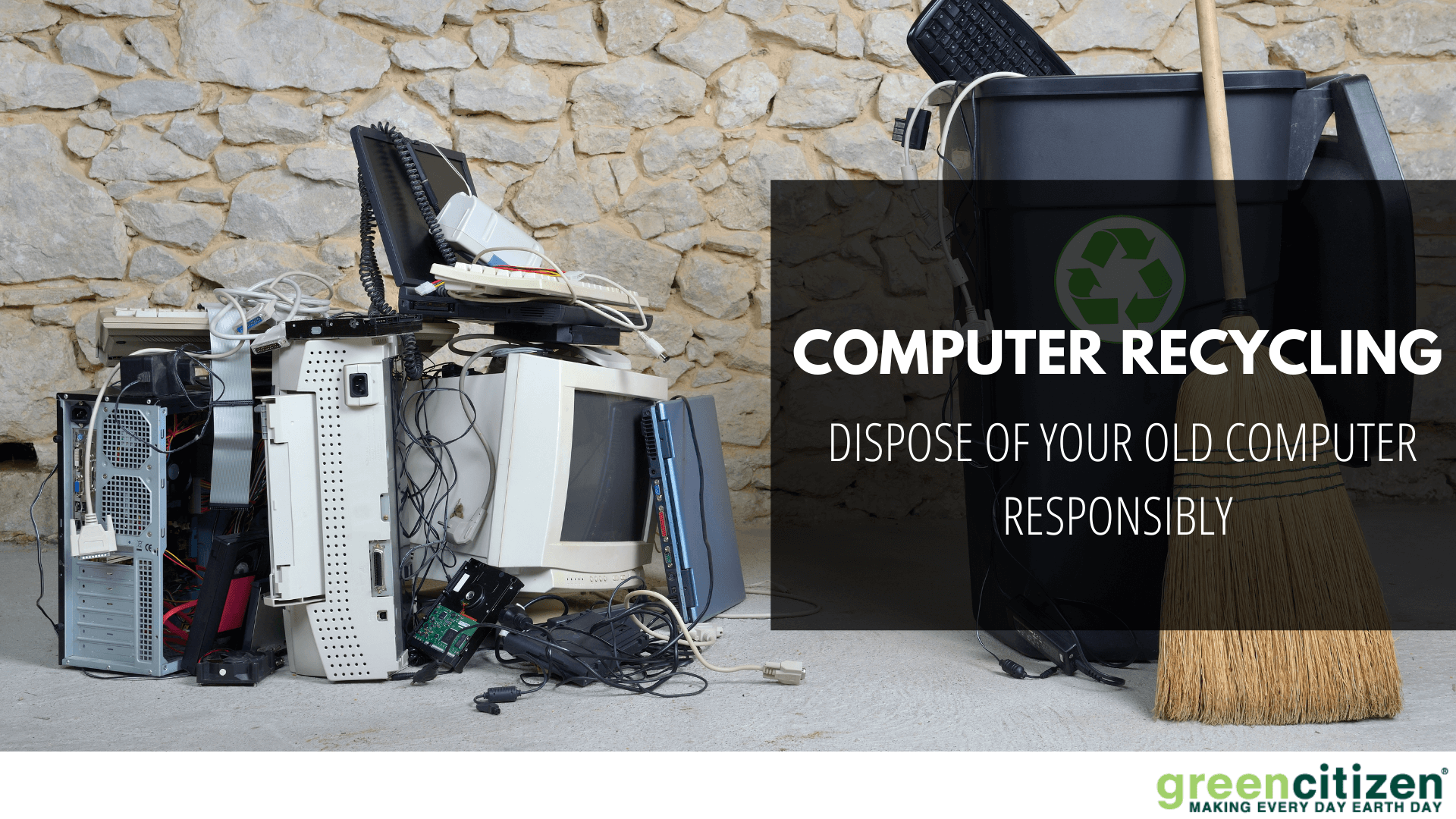
According to the EPA, Americans discard more than 112,000 computers every day.
The real problem is that only 15% of all the e-waste in the country gets recycled. This includes computers and everything else electrical.
Even worse, millions of tons of e-waste are shipped out to developing countries like Ghana, where workers who take them apart for scrap metal are exposed to lead and mercury.
Recycling is the only environmentally safe method of disposing of your old computer.
Here you’ll learn how to get rid of your computer as a true green citizen.
Why Should You Recycle Your Old Computer Responsibly?
Reduce the Amount of Trash
Landfills are expanding not only in the US but all around the world. In other words, we are constantly trying to find more space to dump our trash.
On the other hand, by recycling our computers and e-waste, we reduce the amount of waste that ends up in the landfill.
Don’t let landfills get any bigger — recycle!
Stop Toxic Waste
When computers get bulldozed and tumbled around with communal waste, they break down releasing toxic materials like lead, mercury, beryllium, and cadmium.
Rains easily wash this toxic cocktail deeper into the soil. This pollution can even reach our water streams and do a lot of harm to living organisms.
Heavy metals pose a direct threat to our health, too. It’s not rare that higher levels of lead and mercury are found in communities that live close to dumping sites.
Waste companies often export electronic waste to developing countries, but that just dumps the problem to other people’s doors— pun intended.
Those people in Africa and Southeast Asia who try to earn a living by scavenging through smoldering heaps of e-waste for copper and steel are the ones who are picking up the tab. They often burn the PCBs to salvage the metals in boards — burning PCBs could release toxic fumes in the environment.
Save Raw Materials
Believe it or not, just 2% of materials in your computer aren't recyclable. An amazing 98% of your old PC can be recycled and reused.
But then please someone tell me why are we still dumping almost $7.5 billion worth of raw materials as e-waste every year?
Things like glass, keyboards, casing, cables, batteries, and circuit boards can be reused or recycled for copper or rare metals.
Most importantly, it takes less energy to reuse materials from those components than to source them from scratch.
Secure Your Data
I hate to tell you but deleting the data by right-clicking isn’t enough to keep you safe. You can even format your hard drive, but hackers and identity thieves have means of recovering your stuff.
And that’s the very thing that can happen if you throw away your hard drive.
So, how are computers disposed of safely?
Always go with a professional recycler who offers data destruction.
For a small fee, they will destroy your hard drive before recycling everything else. When it’s all done, they’ll give you a certificate that your data is irrecoverably destroyed.
Don’t Break the Law
Finally, there’s a good chance that dumping your computer is illegal where you live. At the moment, there are 19 states and the District of Columbia that treat computers as hazardous waste and ban landfill disposal.
But even if it is legal where you live, do you seriously think it’s OK to throw your computer along with the potato peels?
Read More:
How to Prepare Your Computer for Recycling?
Backup Your Data
Although cloud seems to be the preferred way of backing up these days, I myself always do it the old-fashioned way — using an external hard drive.
Especially since I can find great deals on 2 to 5TB HDD and SSD drives.
Deauthorize or Deactivate Services and Software
Applications like iTunes and Adobe Creative let you use the same account on a limited number of devices. Before you wipe your disk clean, you should deauthorize those apps on your old computer.
The steps are slightly different from app to app, but the pattern is the same:
- Go to Help or Account
- Click Deactivate or Deauthorize This Device
- Confirm by clicking Yes
Wipe The Hard-Drives/SSDs Clean
Don’t bother with sending all your files and folders into the Recycle Bin. Before you send your computer to recycling, you need to wipe the disk permanently.
This is very easy if you’re using Windows 8.1 and above or Mac OS X, as these systems have utilities that let you delete your data permanently and reinstall the OS with a few clicks.
Special Note: It's possible to retrieve data even after wiping the disk clean. You should always use advanced tools or seek professional services for Hard Drive data Destruction.
Remove the Peripherals
The same computer recycling company that will recycle your machine will likely take your peripherals. Unplug them, and pack them separately.
The keyboard, speakers, mouse, and webcam will likely work on your new computer as well. Reuse them if you can, or donate them to a local school or someone who needs them more than you do.
5 Simple Ways of Electronics Recycling
Take It to Your Nearest E-Waste Recycling Center
Recycling your computer is the safest and the greenest way to dispose of it. Professional recycling centers use industrial recycling machines which achieve high recycling efficiency — your old PC is recycled with less energy and more reusable materials are salvaged.
Besides, an established computer recycling center employs trained and highly skilled staff who are experienced in dismantling all sorts of electronics without damaging vital parts.
But the best thing is that many recyclers actually first try to refurbish or repair your computer and sell it online.
This way no waste is created at all while someone can buy your old computer and use it for many years.
Now that's what I call a sustainable choice!
However, keep in mind that not all PC recycling centers are the same.
Beware of the Irresponsible Recyclers!
Unfortunately, many “recyclers” actually just ship most of the e-waste abroad. Instead of being recycled, usable parts are removed and metals are extracted for scrap.
While this doesn’t sound that bad, keep in mind that the local population pays the highest price.
Methods that are used are far from safe and sustainable.
For example, copper is recovered by burning heaps of cables, while circuit boards are soaked in baths of nitric and hydrochloric acid. When the process is done, the remains are dumped somewhere, with little regard for the environment and human health.
When choosing your recycler always make sure that it:
This way you can be sure that your computer gets recycled with minimum impact to the environment.
Go With Manufacturers’ Recycling Programs
Another environmentally acceptable way of disposing of your old PC or laptop is to use the manufacturers’ take-back programs.
Some manufacturers will take used or broken computers and recycle them. The parts and materials that are worth salvaging can then be used in making new products, which reduces the demand for raw materials.
Use Electronics Stores’ Recycling Offers
Big stores that sell electronics and office supplies, such as Best Buy and Staples, offer their own recycling programs.
Best Buy lets you recycle up to three items per household per day. Since we’re talking about computers here, that limitation shouldn’t be a problem.
Apart from all-in-one computers, they accept cables, connectors, hard drives, and peripherals — all free of charge.
Their recycling policies vary from state to state, in order to comply with local laws.
Make sure you select your state on the Best Buy Recycling page to see if there are any additional conditions or limitations.
Staples also boasts its electronic recycling program. Their drop-off locations also accept all-in-one computers, peripherals, and mobile devices, but the store manager has the right to refuse to accept items that may pose a health or safety risk.
All Staples stores except small-format stores in NYC and Washington DC accept electronics for free recycling.
Ask About the Municipal E-Waste Initiatives
The problem of e-waste is getting to the point that many states and municipalities had to regulate the way we dispose of electronic devices.
This is good news, as your municipality might already have an e-waste recycling program, so you don’t have to look far.
Call your local authorities and ask about the best way to get rid of your computer.
In California, for example, it’s illegal to place electronics in household trash. Instead, the state has offered an effective e-waste recycling program that has collected more than 850 million pounds of electronic waste in five years.
Donate and Help Someone Out
That’s just what I did with my old Lenovo IdeaPad — I wiped it clean, reinstalled the Win10, and presented it to a relative who was off to college.
Even old computers are good enough for basic browsing and writing assignments.
On the other hand, if you don’t know where to donate a laptop, check out these donation services:
Computer Recycling with GreenCitizen
If you chose the safest option and want to recycle your computer without the middleman and with no strings attached, check out GreenCitizen’s electronic recycling program.
GreenCitizen was found in 2005 with the goal to reverse the environmental damage. In this 16 years of journey, we have served responsible citizens and businesses to recycle their old electronics.
This image should help you put our efforts in perspective.
Drop-off at GreenCitizen EcoCenter (for Individuals)
Residents of the San Francisco Bay Area are welcome to bring their old computers and electronics to our EcoCenter in Burlingame.
Our address is — 1831 Bayshore HWY, Suite 2, Burlingame, CA 94010 USA.
You can simply call us at (650) 493-8700.
We guarantee that your computer gets recycled responsibly and locally. Did you know that we recycle computers, laptops, monitors, and tables free of charge?
In case we can reuse or repair your device, we’ll gladly do so and sell it online. This helps us meet our operating costs and keep recycling computers for free.
Business Recycling Pickup & ITAD Services (for Businesses)
Let’s say you run a business on a tight schedule and can’t spare any of your guys and gals to make the drop-off runs.
This is where our Business Pickup Service comes in.
If your company is in the San Francisco Bay Area, simply send us a pickup request and we’ll get everything in line for you.
On your part, you should:
Are you moving out, upgrading your IT infrastructure, or downsizing your current business? GreenCitizen can help you offset your deployment costs if you choose to liquidate your obsolete or unwanted IT assets with our leading IT Asset Disposition (ITAD) services.
Mail-in Electronics Recycling
You live outside the San Francisco Bay Area? Maybe you’re not comfortable doing business in person in the midst of the COVID-19 epidemics?
We got you covered.
You can mail in your computer and our technicians will inspect it, try to reuse it, or recycle it free of charge.
This is how it works:
- Pack your device and fill out the Mail-In Recycling Form
- Send it to us with your preferred shipping provider
- We send you an email confirmation when we get your package
- If you want your data destroyed, we email you the Certificate of Destruction
Data Destruction Services
I mentioned earlier that you can opt for Data Destruction Service with your computer.
So what’s this about?
The practice has shown that discarded or donated computers and media devices are a valuable source of information for identity thieves.
Trust me, even if you’ve wiped your hard disk clean, hackers can recover the data if they give it enough effort. (I could’ve definitely used one when the SD card in my phone died)
That’s why here at GreenCitizen we take our client’s privacy very seriously.
Upon arrival:
- We add each hard drive’s serial and model number to our database
- Crush the unit in our hard disk destroyer
- Send you a Certificate of Destruction
For businesses, we also offer onsite hard disk destruction. For this, we use a portable hard disk destroyer (no, it’s not a baseball bat) and your staff can watch us crush the hard drives.
If you want to keep using the drives but want all previous data erased, we can help with that, too.
At your request, we will perform data erasure following the National Industrial Security Program (NISP) Operating Manual, as recommended by the U.S. Department of Defense.
Green Directory Service
We have developed a service that can show you where to recycle computers wherever you live in the US.
Our Green Directory Service is very straightforward and simple to use.
And there you go!
We show you the list of the nearest recycling centers or drop-off locations that take desktop computers, the distance from your place, and all the business details.
If you’re more of a visual type, there’s also Google Maps with all the computer recycling locations from the list.
FAQ
You can dispose of old computers by having them recycled at a reputable recycling center, through the manufacturer, or store program. You can also donate them.
No, you can’t throw a computer in the garbage. Dumping a computer with household trash is illegal in most states.
Unplug the computer from the outlet and make sure you’re not holding a static charge. Open the PC case using a Phillips head screwdriver. Disconnect the drive from the wide and flat IDE ribbon cable and then disconnect the power cable jack.
Go to the Start Menu and click on Settings. Make way to Update & Security and find the recovery menu. Select Reset this PC and follow the instructions.
If you can’t reuse or repair them, the best way to get rid of your old computers is to have them recycled by professionals.
Yes, you can get files off a dead computer, unless the hard drive is physically damaged. You need a USB universal drive adapter and another working computer to plug your hard drive into.
Yes, it is possible to recover data from a dead hard drive, but you need solid hacking skills. Physical computer destruction which also destroys the hard drive is the only way to keep your deleted files safe from unlawful recovery.
Conclusion
There are several right ways to dispose of your old computer and every one of them is better than sending it to the landfill.
However, responsible and professional computer recycling is the best method by far.
Recycling makes sure that no toxic materials leak into the environment while at the same time salvaging reusable materials and components.
If you have any questions about our sustainable recycling methods or want to know more about computer equipment disposal, feel free to ask.

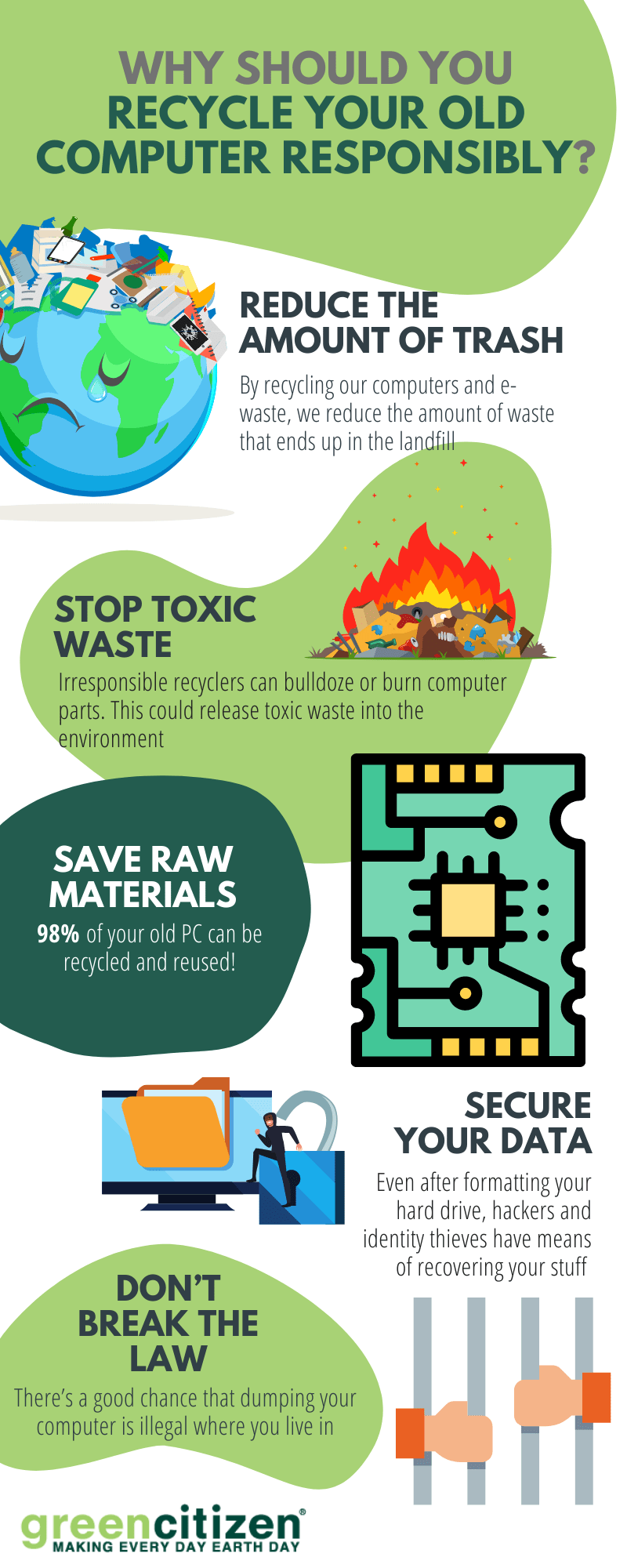

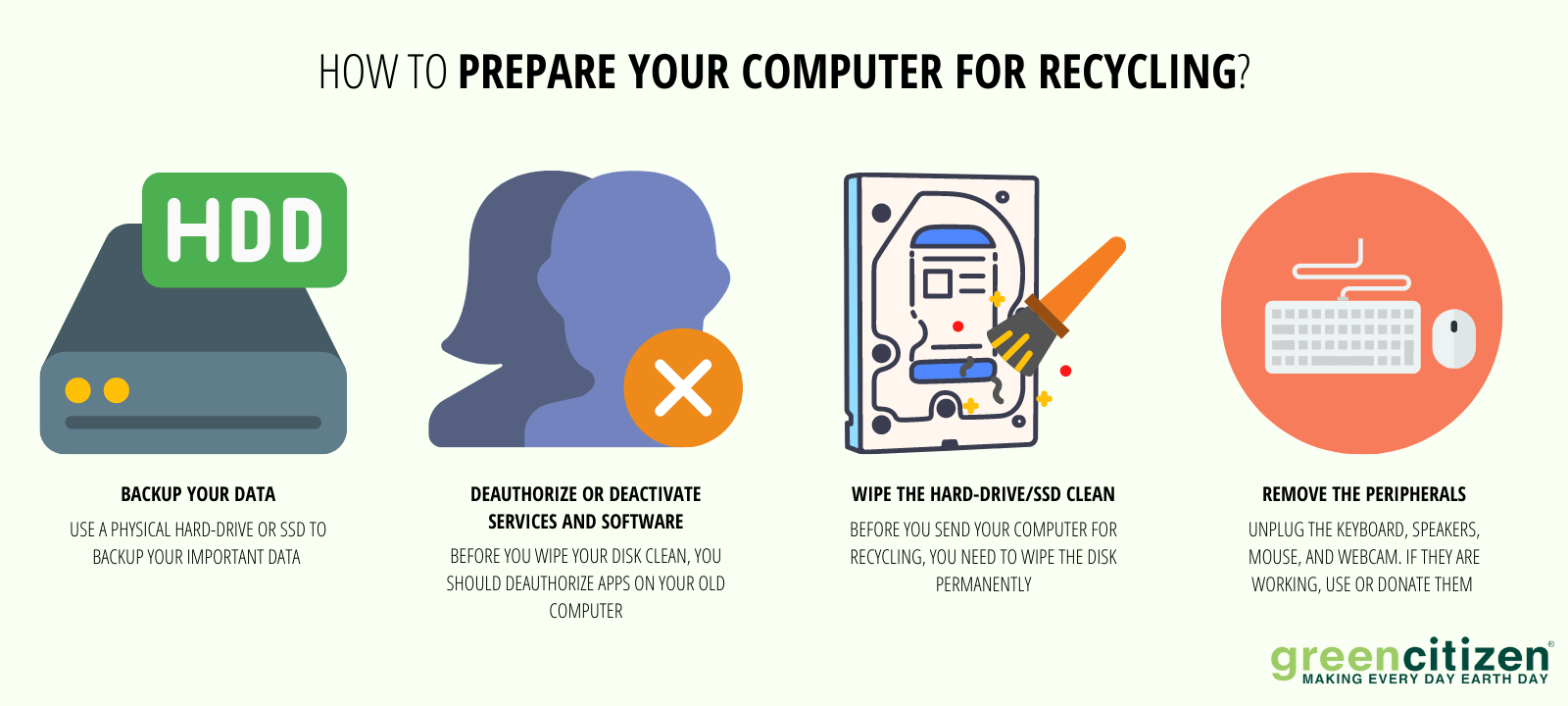

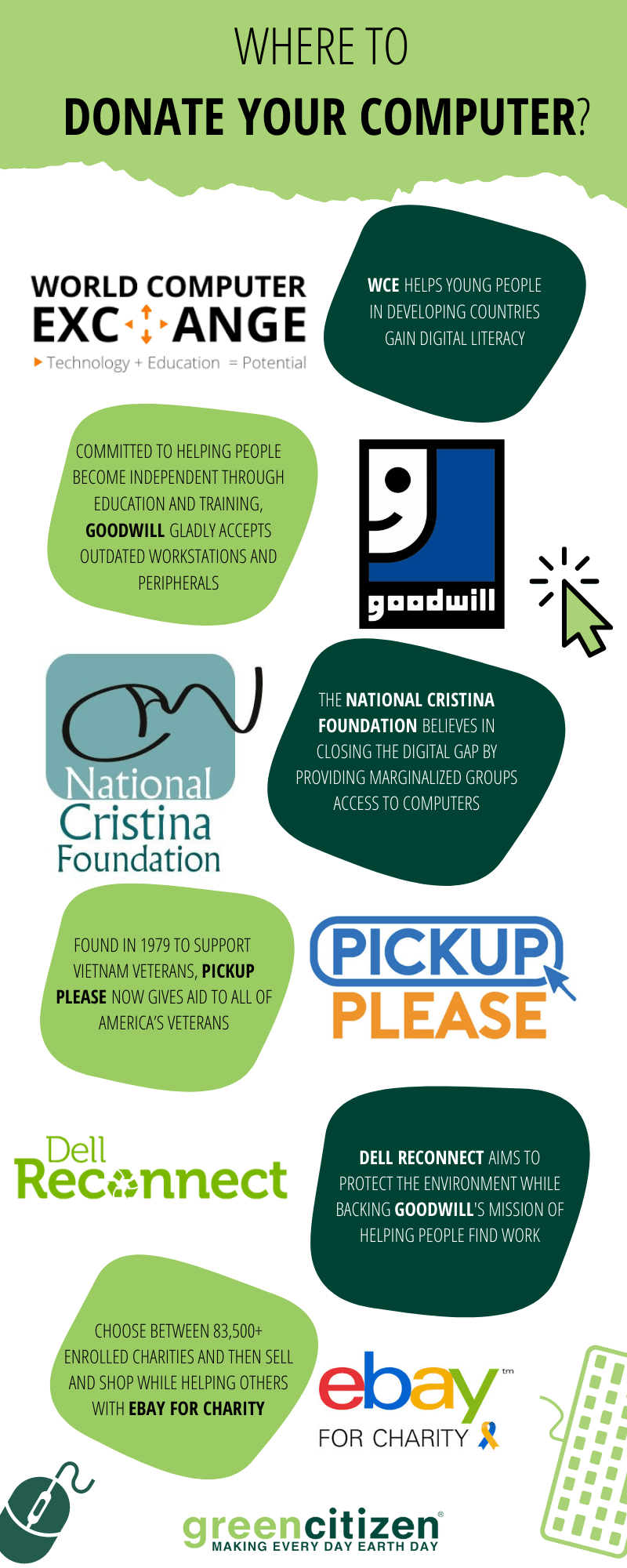
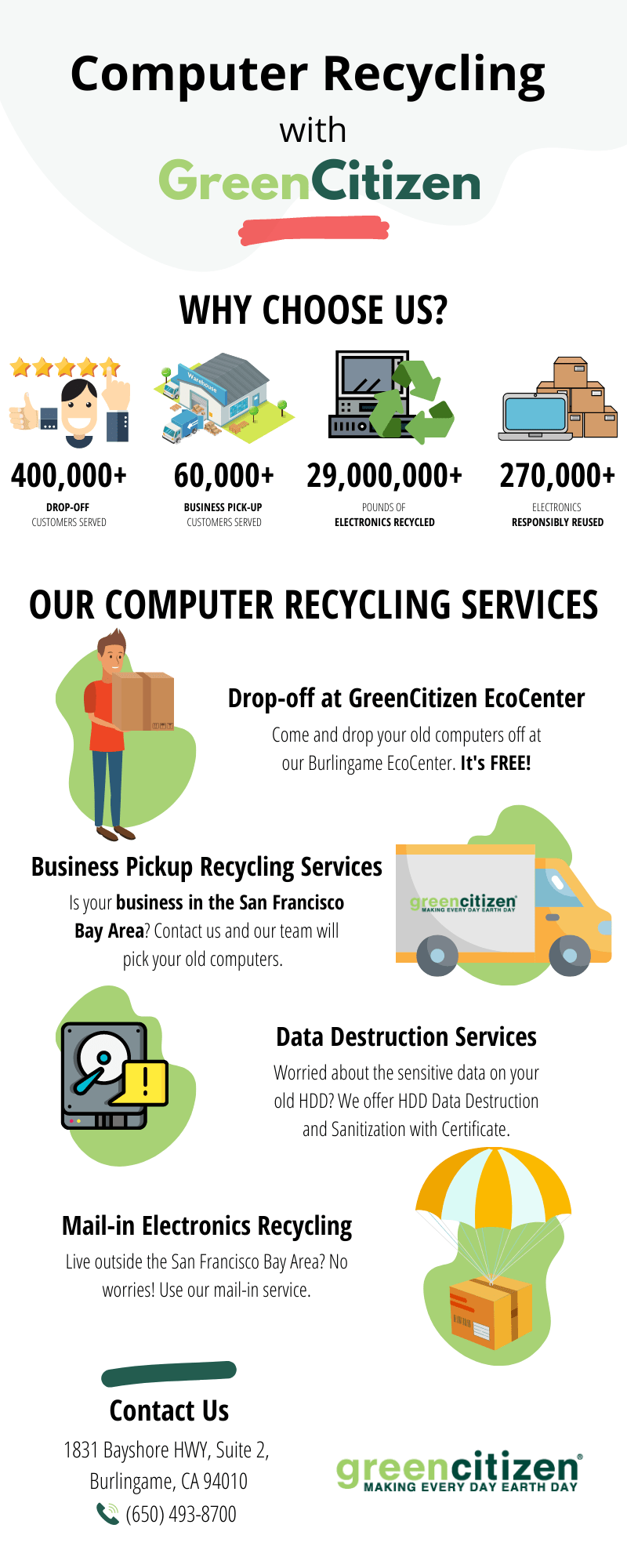










Pingback: How to Dispose of Old Computers Safely - First America
I loved it when you said that recycling is the only environmentally safe method of disposing of your old computer. We have plenty of old computers that are not used for a long time ago. I realized how important it is to recycle. This post I helpful in finding the best computer recycling services in town.